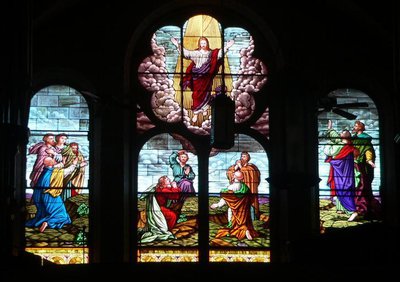Thoughts for the Day
Thursday, 18th May 2023: Ascension
Luke Jesus Christ Disciples Ascension Acts 1
Reading : Verses from Acts, Chapter 1

In the first book, Theophilus, I wrote about all that Jesus did and taught from the beginning until the day when he was taken up to heaven, after giving instructions through the Holy Spirit to the apostles whom he had chosen. After his suffering he presented himself alive to them by many convincing proofs, appearing to them over the course of forty days and speaking about the kingdom of God. While staying with them, he ordered them not to leave Jerusalem, but to wait there for the promise of the Father. ‘This’, he said, ‘is what you have heard from me; for John baptized with water, but you will be baptized with the Holy Spirit not many days from now.’
So when they had come together, they asked him, ‘Lord, is this the time when you will restore the kingdom to Israel?’ He replied, ‘It is not for you to know the times or periods that the Father has set by his own authority. But you will receive power when the Holy Spirit has come upon you; and you will be my witnesses in Jerusalem, in all Judea and Samaria, and to the ends of the earth.’ When he had said this, as they were watching, he was lifted up, and a cloud took him out of their sight. While he was going and they were gazing up towards heaven, suddenly two men in white robes stood by them. They said, ‘Men of Galilee, why do you stand looking up towards heaven? This Jesus, who has been taken up from you into heaven, will come in the same way as you saw him go into heaven.’
(Lectionary, New Revised Standard Version)
Thoughts
I have been watching 'The Repair Shop' on television, a show that uses conservators to repair items of intrinsic value to members of the public. Often these have great sentimental value but have fallen into disrepair - from ancient teddy bears to old clocks, and old musical instruments to a penny-farthing bicycle. When the item has been restored, and the owners come to collect it, a question like "So what would your father now think of this, if he were still alive?" is asked. The answer almost always is, "He would be looking down from up there, and smiling!" This is accompanied by a look up at the rafters of the barn, for heaven is always seen as "up there"!
So it is that Luke, the writer of the Acts of the Apostles (and the Gospel of Luke) indicates that Jesus' work on earth as a man is finished. It is one of the fullest of the Ascension accounts, with Jesus seen as ascending upwards. We should not assume heaven is 'up there' though, after all Jesus could presumably have removed Himself to the spiritual realm of His Kingdom in any way He chose. It is rather a kind of 'acted parable', a physical indication that Jesus is leaving to instigate the era of the Holy Spirit. The post-resurrection appearances are now at an end, and He has gone to prepare a place for us. He leaves a message that He will come again one day, but in the meantime the disciples, and his followers today, are to be witnesses to His life and work "to the ends of the earth".
Prayer
Lord Jesus Christ,
as we remember Your Ascension this day,
we thank You that though You left the earth
it was only in order to complete the plan
and to send the Holy Spirit
to be with Your people.
We thank You that the apostles
were to carry out Your command to
spread the Good News of the Gospel
to the ends of the earth,
and we ask Your help in continuing
that task today in our world.
Amen.
Here is an imaginary idea of how the Ascension might have happened;
You might like to play this traditional hymn: